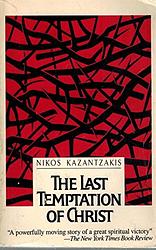The Last Temptation of Christ by Nikos Kazantzakis
This novel presents an alternative interpretation of the life of Jesus Christ, who is depicted as a conflicted, all-too-human figure who struggles with his divine destiny. The book explores his journey through life, his friendships, his fears, and his ultimate temptation to avoid crucifixion and live a normal life. The narrative delves into the psychological and emotional aspects of his experiences, creating a complex, humanized portrayal of a traditionally divine figure.
The 1104th greatest book of all time
- Published
- 1955
- Nationality
- Greek
- Type
- Fiction
- Pages
- 300-500
- Words
- 134,000
- Original Language
- Greek
If you're interested in seeing the ranking details on this book go here
This book is on the following lists:
- 789th on Our Users' Favorite Books of All Time (The Greatest Books Users)
- 1001 Books You Must Read Before You Die (The Book)
- The 100 Best Books of Two Centuries of Modern Greek Literature (1813 – 2013) (Black & White Publishing SA)

